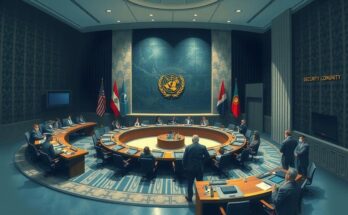Recent weeks have seen a sharp rise in violence across South Sudan, particularly involving forces loyal to President Salva Kiir and Vice President Riek Machar. Renewed skirmishes and political turmoil threaten the fragile 2018 peace agreement that ended a five-year civil war. Uganda’s military support for Kiir and the deepening economic crisis could lead to severe humanitarian consequences, raising fears of escalating violence and ethnic conflict within the nation.
In recent weeks, South Sudan has witnessed a significant escalation in insecurity, with intensified fighting reported in Upper Nile, Western Equatoria, and Western Bahr el Ghazal states. The resurgence of conflict follows increased skirmishes between forces loyal to President Salva Kiir and Vice President Riek Machar, marking a worrying shift from the tenuous peace established by a 2018 agreement, which ended a prolonged civil war resulting in over 400,000 fatalities.
The South Sudanese government has charged Machar and his supporters with collaborating with the White Army, a militia primarily made up of the Nuer ethnic group, in response to an assault on a military base that led to multiple arrests, including prominent military officials. The rising tensions threaten the already fragile 2018 peace deal, which had previously played a crucial role in maintaining a semblance of stability.
Amid these tensions, violent protests erupted in Western Bahr el-Ghazal due to President Kiir’s unilateral reshuffle of the cabinet—a move that dismissed key officials, including Vice Presidents James Wani Igga and Hussein Abdelbagi, without sufficient justification. This politically charged action has been perceived as a “soft coup,” highlighting Kiir’s tactics to consolidate power, particularly in the lead-up to elections that have been repeatedly postponed.
In a move to bolster Kiir’s administration, Uganda has dispatched special forces to Juba, citing a need to secure the capital and prevent a spillover of violence. However, the presence of Ugandan troops could further complicate the already intricate political landscape and might impede opportunities for legitimate peace dialogues, as it prioritizes support for Kiir’s government over reconciliation efforts.
The precarious situation is exacerbated by mounting economic pressures stemming from ongoing conflict in neighboring Sudan, leading to serious ramifications for South Sudan’s oil infrastructure. The loss of oil revenues due to conflicts has critically compromised the economy, driving widespread discontent among citizens struggling with rising food prices and diminishing humanitarian support.
The conflict’s roots lie in the manipulation of ethnic identities by political elites for personal and political advantage. The concentration of oil revenues, which constitute 90 percent of the nation’s income, has intensified ethnic disparities, especially as resource distribution is heavily biased toward Kiir’s Dinka-dominated forces, systematically excluding Machar’s Nuer followers. This division has instigated widespread violence and human rights abuses across myriad communities.
As conflicts continue to brew, experts forecast a heightened likelihood of violence, particularly in Malakal, a key multi-ethnic urban center, which could become the trigger for further communal massacres and nationwide disorder. The general population voices discontent over government inefficacy, with a staggering 69 percent requiring humanitarian aid, emphasizing a dire need for a resolution to the ongoing crises and for the possibility of democratic elections—a hope that seems increasingly distanced as timelines shift further out to 2026.
The situation in South Sudan remains volatile, with increasing violence threatening to unravel the fragile peace established by the 2018 agreement, amidst ongoing ethnic tensions and economic strife. The geopolitical landscape is further complicated by foreign interventions, while the historical patterns of resource allocation continue to fuel unrest. The outlook appears grim, with potential for catastrophic humanitarian outcomes if the current trajectory is not altered through meaningful dialogue and reform. The future of governance in South Sudan, marked by postponed elections, casts a shadow over its hope for stability and peace.
Original Source: thesoufancenter.org




